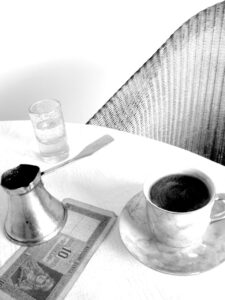
Balkan Coffee
kahve — kar-vay (Turkish) kafa — ka-fa (Bosnian Serbian) karve — kar-vez (Greek)
 To make the coffees use an ibric, aka dzesze (jez-ma)—a saucepan will do—and finely ground Turkish blend of coffee.
To make the coffees use an ibric, aka dzesze (jez-ma)—a saucepan will do—and finely ground Turkish blend of coffee.
All the Balkanista use a Turkish blend of coffee, all have an obsession with the foam on top of the coffee, and they all serve their coffee in espresso size cups—the more ornate the better. The differences between Turkish/Bosnian, Serbian and Greek coffee lie not in the ingredients but in the method of preparation.
Turkish coffee was originally a blend of dark, and medium or light roasts from the Yemen and Ethiopia. These days Brazilian beans are used in the packaged blends. So if you want to be authentic, and love your coffee, get yourself down the Algerian Coffee Stores on Old Compton Street—they sell online—where you will find Yemeni Matari and a variety of Ethiopian beans. Create your own blend. If you’re lazy they sell a Turkish blend called ‘Gourmet Mulatte’ which is pretty good. If you’re really lazy you can buy Mehmet Effendi pre-packed coffee from most good delis or online.
Turkish/Bosnian* Coffee — kahve or kafa
4 Persons
If you are making four cups then you need to measure out exactly four cups of cold water and pour into your dzesve. Add four teaspoons of sugar** to the dzesve and without stirring bring to the boil.Pour off a third of the water and keep.
Add four heaped teaspoons of coffee to the dzesve, stir and return to a medium heat. When the coffee begins to foam around the edges quickly remove the dzesve from the heat. Allow to cool for fifteen seconds before returning to the heat. Once the coffee begins to foam again remove from the heat and scope off the foam with a spoon and share amoungst the four espresso cups.
Return dzesve to the heat. This time, let the foam rise towards the lip of the dzesve and then remove from the heat. Add the hot water that was set aside earlier to the dzesve and pour out your finished coffee into your espresso cups.
Serve with a glass of water.
Serbian Coffee — kafa
4 Persons
Serbian coffee is prepared individually in single cup dzesves. In other words if you were preparing four cups of coffee you would need to have four one cup dzesves*** on the go.
Add an espresso cup of water, and a teaspoon of sugar to each of your dzesves. Bring dzesves to the boil. Add a heaped teaspoon of coffee to each dzesve and return to a medium heat. Follow the method above for making Turkish/Bosnian coffee from this point on, but don’t scoop off the foam this time.
Serve dzesves on a tray with four coffee cups, four teaspoons, a jug of water and glasses. Your guests can then save the foam from the foaming dzesves with their own spoons, and pour their own coffees from their mini dzesves. A few drops of water are added to each cup to help the coffee grinds settle and then the cups are capped with a spoonful of saved foam.
Greek Coffee — kavez
4 persons
Measure out exactly four cups of cold water and pour into your dzesve. Add four teaspoons of sugar and four heaped teaspoons of coffee to the dzesve. Stir and heat mixture on a low heat. When the coffee begins to foam remove from the heat for a few seconds and return to the heat, repeat process three times. Don’t rest dzesve on heat during this process, it will boil and you don’t want that to happen. After three visits to the heat the coffee is ready to serve.
The foam is held back with a spoon and evenly distributed amoungst the four cups.
*Bosnians pronounce coffee the same way the Serbs do.
**Sugar quantity is obviously to taste but this is the most common proportion of sugar to coffee.
***Mini dzesves can be purchased online.

Yum!
Greeks call coffee “Kafe” not kavez